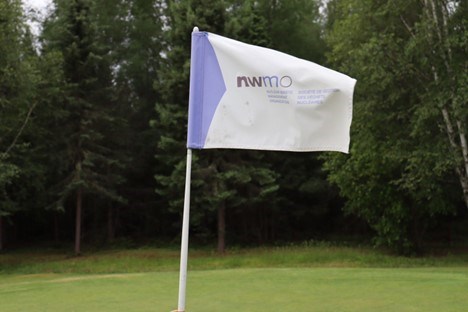IGNACE — Before a high-level nuclear waste site can be built in the region the project’s proponent has a long regulatory process to navigate.
The Nuclear Waste Management Organization held a media briefing Wednesday afternoon to explain what is scheduled to happen over the next nearly 20 years.
That’s how long the NWMO says it will take to go through the process the government-mandated and industry-funded organization is counting on to approve the construction of a deep geological repository at Revell Lake, between Ignace and Wabigoon Lake Ojibway Nation.
Now that a preferred site has been chosen, the impact assessment process will soon begin, said Carolyn Fell, the NWMO’s manager of impact assessment communications.
“This is coordinated by the Impact Assessment Agency of Canada and integrated with the initial license application to the Canadian Nuclear Safety Commission,” she said.
“This process will ensure that details like impacts on harvesting, hunting, and Indigenous ways of life are considered alongside any potential impacts on overall environment, health, social and economic factors.”
A media release from the organization said the assessment’s purpose is “to help ensure projects are planned in a way that protects people and the environment.”
“It is a tool used to look at the positive and negative effects a project might have. It also helps gather information from different groups and experts so that better decisions can be made,” the release said.
The project has drawn opposition from citizen and environmental groups, as well as a number of area First Nations. Some municipalities, including Thunder Bay, have also supported anti-nuclear activists.
The first step in the assessment process, Fell said, is for the NWMO to submit an initial project description to the impact assessment agency. Materials shared by the waste management organization said the description will include site-specific details about what the project is, where it is and what could be affected by it and effectively contain a preliminary assessment of the project’s impacts.
It will also include community concerns, areas where more study is required and plans for engagement and communication.
“The impact assessment has not started yet,” Fell said. “Early input from the host communities, Indigenous communities in the region and the public, is helping to shape our initial project description for submission to the regulators, and will help inform our path forward in decision making.”
Once the project description has been submitted, Fell said, the impact assessment agency starts its own consultations, which effectively triggers the official start of the assessment process, which lasts up to three years.
Further review by a panel, including public hearings, subsequently take place, ultimately culminating with a ministerial decision statement with conditions sometime in 2030. From there, Fell said, “the integrated review panel issues any applicable licences, including a licence from the (nuclear safety commission).”
The commission “will then undertake required follow-up and ongoing compliance monitoring and continues to be the life cycle regulator for the life of the project.”
Wabigoon Lake will also conduct its own separate review process, which runs parallel to the impact assessment, Fell said.
“It's really important to note that there will be opportunities throughout the process (to provide feedback),” she said.
Should the regulatory approvals happen, Fell said “we could start seeing shovels in the ground,” around 2034.
Dates for public engagement sessions are planned for Ignace on July 24 from 5:30 to 7:30 p.m. at the Learn More Centre and on July 25 from 9:30 to 11:30 a.m. at the Upper Curling Hall. A drop-in session is scheduled in Dryden on August 12 from 3 to 5 p.m. at the Dryden Native Friendship Centre and a presentation and moderated discussion is slated in the community on August 13 from 6 to 8 p.m. at the Dryden Regional Training and Cultural Centre.
There will also be a pair of online webinars on August 6, as well as a five-week window — beginning on July 17 — for written submissions.
